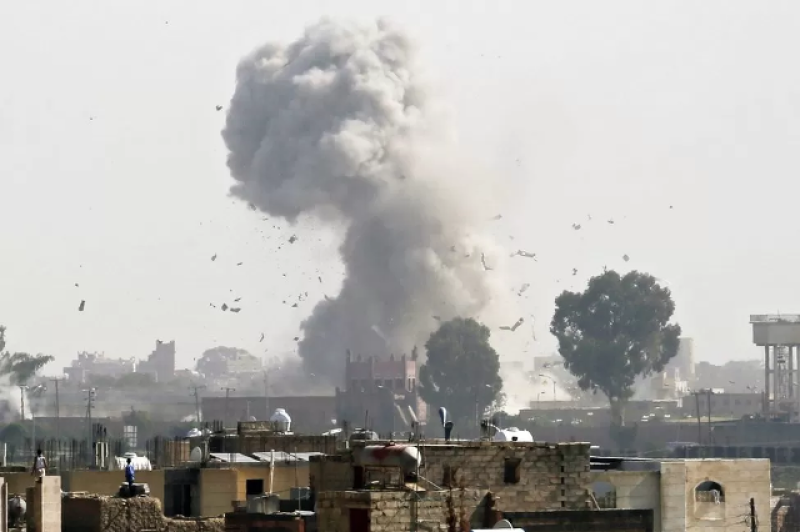- Sri Lanka urges Pakistan to reconsider India match |
- Centre of World Cup storm Mustafizur lands PSL deal with Lahore |
- BNP and Jamaat election camps vandalized in Gazipur |
- Dhaka requests UN rights office investigation into Hadi murder |
- Bangladesh establishes formal diplomatic ties with Grenada |
My family massacred on my wedding day

War in Yemen
Jehangir Hussain
My wedding should have been filled with the usual range of wonderful emotions – excitement, trepidation, joy, anxiety and love. Instead, it was marked by terror, devastation and loss, writes Ayman Mohamed Saleh Al Sanabani in the Guardian.
The night of 5 October 2015 began so beautifully as my two brothers and I each prepared to wed our brides from nearby villages. We, our families and our guests came together at my uncle’s house, which had been transformed for the festivities: large tents were set up, delicious smells wafting in the breeze. The brides arrived in a 30-car caravan with honking horns, blaring music and cheering heralding their arrival, before gathering with relatives inside one of the houses.
Without warning, the joyful sounds of celebration were overcome first by the deafening roar of airplanes, then by the pierce of a missile through the air, then a bone-rattling boom. The sky turned red. I closed my eyes. Everything stopped.
Unimaginable horrors greeted me when I opened my eyes. Mangled bodies lay around the courtyard. One missile struck the house where our wives-to-be had gathered with relatives, many of them just children. Those who could still stand began frantically digging through the rubble for their loved ones in spite of the risk that another strike could be imminent. Strangled voices cried out – those who were trapped beneath, those who lay dying and those who were desperate to salvage a scrap of hope in the wreckage.
Would it surprise you to learn that America is in part to blame for these horrors? And that, had Joe Biden kept a campaign promise, future atrocities like this might not be so likely?
Forty-nine people were killed that day, almost half children. Among them were some of the people I loved the most in this world: my bride, Jamila; both of my parents, Mohammad and Fayiza; and two of my brothers, Jamal and Eid. At least 75 more were badly injured, but all who survived will carry the mental scars of this day for the rest of their lives. I have not been able to return to the site since. I don’t want to remember what happened that day.
This attack was just one of the thousands of indiscriminate bombings carried out on the people of Yemen by the United Arab Emirates and a Saudi Arabia-led coalition since September 2015 under the guise of stopping Houthi rebels. Instead, these assaults regularly target innocent civilians and the infrastructure that our communities rely on. They have claimed the lives of a quarter of a million Yemenis and devastated our country.
What is happening to Yemen is widely considered to be the largest humanitarian crisis in the world. Not one single death would have been possible without the complicity of the United States and its largest defense contractors, Lockheed Martin, Raytheon and General Dynamics.
Then presidential candidate Biden promised in 2019 that he would “end the sale of [arms] to the Saudis’’ and that “they have to be held accountable”. In one of his first speeches as president, Biden told the US state department that he would put an end to US support of the war on my home country. It was a major departure from his predecessors, Donald Trump and Barack Obama, and it brought hope to Yemenis here and around the world, as well as international observers and human rights organizations and activists.
Finally, it seemed, the constant flow of top-of-the-line weaponry to the Saudi coalition, and the seemingly endless atrocities like the one that destroyed my family, would cease.
But in the two years since that speech, Biden’s once-solid resolve seems to have floundered. When members of Congress took steps to stop or limit the provision of weapons to the coalition, Biden intervened and the bill never got a vote. Instead, he has championed a fragile truce with Saudi Arabia under which Yemenis do not feel an ounce of protection.
The US has been noticeably and stunningly absent from efforts to end the conflict. The recent developments around Saudi Arabia and Iran’s deal to restore diplomatic ties are evidence that ending the war is not hopeless. But it is up to the US government to decide to play a meaningful, active role in stopping these war crimes, rather than letting profit motives win out.
Biden – I may not be your constituent, but your actions affect me. As evidenced by your latest budget, your failure to stop US weapons from getting into the hands of the global powers that have made a wreckage of my life, my family and my home affects me. The people of Yemen are relying on your leadership to put an end to this bloodshed. You must keep your promise.
• Ayman Mohamed Saleh Al Sanabani is a Yemeni citizen and plaintiff in a lawsuit against Saudi Arabia, the United Arab Emirates, the US state department, the US defense department, Raytheon, Lockheed Martin and General Dynamics for human rights violations in Yemen
jehangirh01@gmail.com

